Items in Remembering Lincoln that are transcribed.
from Jul. 4, 1865
Colored People's Educational Monument Association Celebration
-
Full Title
Celebration by the Colored People's Educational Monument Association in Memory of Abraham Lincoln
-
Description
On July 4, 1865--the first Independence Day after Lincoln's assassination--the Colored People's Educational Monument Association held a celebration in Washington, D.C., in commemoration of Lincoln, featuring speeches by prominent individuals such as Elder D.W. Anderson, the pastor of Washington's Nineteenth Street Baptist Church, William Howard Day, Senator Henry Wilson of Massachusetts, Senator Michael Hahn of Louisiana, and General Edgar Gregory. The speakers reflected on what the past year's events had meant.
-
Source
-
Rights
This item is in the public domain and may be reproduced and used for any purpose, including research, teaching, private study, publication, broadcast or commercial use, with proper citation and attribution.
-
Tags
-
Cite this Item
Colored People's Educational Monument Association. "Celebration by the Colored People's Educational Monument Association in Memory of Abraham Lincoln". McGill & Witherow. Remembering Lincoln. Web. Accessed December 15, 2025. https://rememberinglincoln.fords.org/node/1128
-
Creator
Colored People's Educational Monument Association
-
Publisher
McGill & Witherow
-
Date
July 4, 1865
from Jul. 4, 1865
Celebration by the Colored People's Educational Monument Association in Memory of Abraham Lincoln
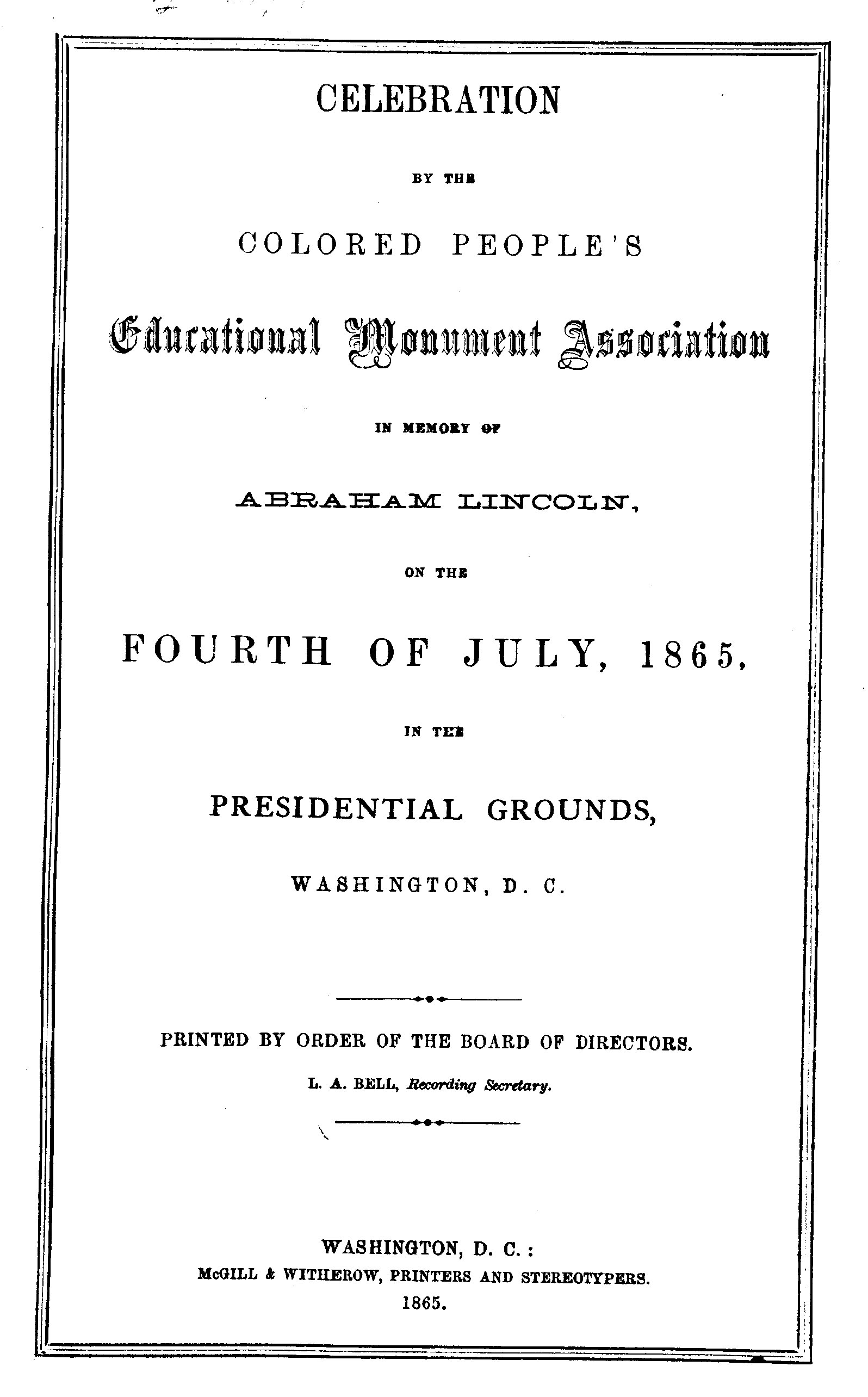
-
Description
On July 4, 1865--the first Independence Day after Lincoln's assassination--the Colored People's Educational Monument Association held a celebration in Washington, D.C., in commemoration of Lincoln, featuring speeches by prominent individuals such as Elder D.W. Anderson, the pastor of Washington's Nineteenth Street Baptist Church, William Howard Day, Senator Henry Wilson of Massachusetts, Senator Michael Hahn of Louisiana, and General Edgar Gregory. The speakers reflected on what the past year's events had meant.
-
Source
-
Rights
This item is in the public domain and may be reproduced and used for any purpose, including research, teaching, private study, publication, broadcast or commercial use, with proper citation and attribution.
-
Creator
Colored People's Educational Monument Association
-
Publisher
McGill & Witherow
-
Date
July 4, 1865
from Apr. 18, 1865
President Abraham Lincoln's Washington, DC Funeral Directions and Notes
-
Full Title
President Abraham Lincoln's Washington, DC Funeral Directions and Notes
-
Description
This is a letter and invitation to Matias Romero, the minister of the Mexican Republic, to the funeral of President Abraham Lincoln at the White House. It includes the funeral procession, schedule and list of pallbearers.
-
Transcription
REPUBLIC OF MEXICO. 81
No. 3.
Mr. Hunter to Mr. Romero.
DEPARTMENT OF STATE,
Washington, April 18, 1865.
Sir: I have the honor to enclose a programme of arrangements for the obsequies of the late President. The religious services will take place at the Executive mansion at 12 o'clock to-morrow. Your attendance at half past eleven is invited.
I have the honor to be, with the highest consideration, your obedient servant,
W. HUNTER,
Acting Secretary.
Señor MATIAS ROMERO. &c., Washington, D. C.
_________
[Enclosure No. 1.]
Official arrangements at Washington for the funeral solemnities of the late Abraham Lincoln, President of the United States, who died at the seat of government on Saturday, the 15th day of April, 1865.
WAR DEPARTMENT,
Adjutant General’s Office, Washington, April 17, 1865.
THe following order of arrangements is directed:
ORDER OF THE PROCESSION.
Funeral escort—in column of march.
One regiment of cavalry.
Two batteries of artillery,
Battalion of marines.
Two regiments of infantry.
Commander of escort and staff.
Dismounted officers of marine corps, navy and army, in the order named.
Mounted officers of marine corps, navy army, in the order named.
All military officers to be in uniform, with side-arms.
CIVIC PROCESSION.
Marshal.
Clergy in attendance.
The Surgeon General of the United States army and physicians to to the deceased.
Pall-bearers. HEARSE. Pall-bearers.
Pall-bearers. Pall-bearers.
On the part of the Senate : On the part of the House :
Mr. Foster, of Conecticut, Mr. Dawes, of Massachusetts.
Mr. Morgan, of New York. Mr. Coffroth, of Pennsylvania.
Mr. Johnson, Maryland. Mr. Smith, of Kentucky.
Part ii----6
82 REPUBLIC OF MEXICO.
Mr. Yates of Illinois. Mr. Colfax, of Indiana.
Mr. Wade, of Ohio, Mr. Worthington, of Nevanda.
Mr. Conness, of California. Mr. Washburne, of Illinois.
Army: Navy:
Lieutenant General U. S. Grant Vice-Admiral D. G. Farragut.
Major General H. W. Halleck. Rear-Admiral W. B. Subrick.
Brevet Brigadier General W. A. Nichols. Colonel Jocab Zeilin, marine corps.
Civilians:
O. H. Browning. Thomas Corwin.
George Ashmun. Simon Cameron
Family.
Relatives.
The delegations of the States of Illinois and Kentucky, as mourners.
The President.
The cabinet ministers.
The diplomatic corps.
Ex-Presidents.
The Chief Justice and Associate Justices of the Supreme Court.
The Senate of the United States, preceded by their officers.
Members of the House of Representatives of the United States.
Governors of the several States and Territories.
Legislatures of the several States and Territories.
The federal judiciary and the judiciary of the several States and Territories.
The Assistant Secretaries of State, Treasury, War, Navy, Interior, and the
Assistant Postmaster General, and the Assistant Attorney General.
Officers of the Smithsonian Institution.
The members and officers of the Sanitary and Christian Commissions.
Corporate authorities of Washington, Georgetown, and other cities.
Delegations of the several States.
The reverend the clergy of the various denominations.
The clerks and employés of the several departments and bureaus, preceded by
The heads of such bureaus and their respective chief clerks.
Citizens and strangers.
The troops designated to form the escort will assemble in the avenue, north of the President’s House, and form line precisely at 11 o'clock a. m., on Wednesday, the 19th instant, with the left resting on Fifteenth street. The procession will move precisely at 2 o’clock p. m., on the conclusion of the religious services at the Executive Mansion, (appointed to commence at 12 o’clock, meridian,) when minute-guns will be fired by detachments of artillery stationed near St. John’s Church, the City Hall, and at the Capitol. At the same hour the bells of the several churches in Washington, Georgetown, and Alexandria will be tolled.
At sunrise on Wednesday, the 19th instant, a federal salute will be fired from the military stations in the vicinity of Washington, minute-guns between the house of 12 and 3 o’clock, and a national salute at the setting of the sun.
The usual badge of mourning will be worn on the left arm and on the hilt of the sword.
By order of the secretary of War:
W. A. NICHOLS,
Assistant Adjutant General
[Transcription by: Grace C., Dr. Susan Corbesero’s Class, Ellis School, Pittsburgh, Pennsylvania] -
Source
Google Books
-
Rights
This item is in the public domain and may be reproduced and used for any purpose, including research, teaching, private study, publication, broadcast or commercial use, with proper citation and attribution.
-
Tags
-
Cite this Item
William Hunter. "President Abraham Lincoln's Washington, DC Funeral Directions and Notes ". Government Printing Office. Remembering Lincoln. Web. Accessed December 15, 2025. https://rememberinglincoln.fords.org/node/1126
-
Creator
William Hunter
-
Publisher
Government Printing Office
-
Date
April 18, 1865
from Apr. 18, 1865
President Abraham Lincoln's Washington, DC Funeral Directions and Notes
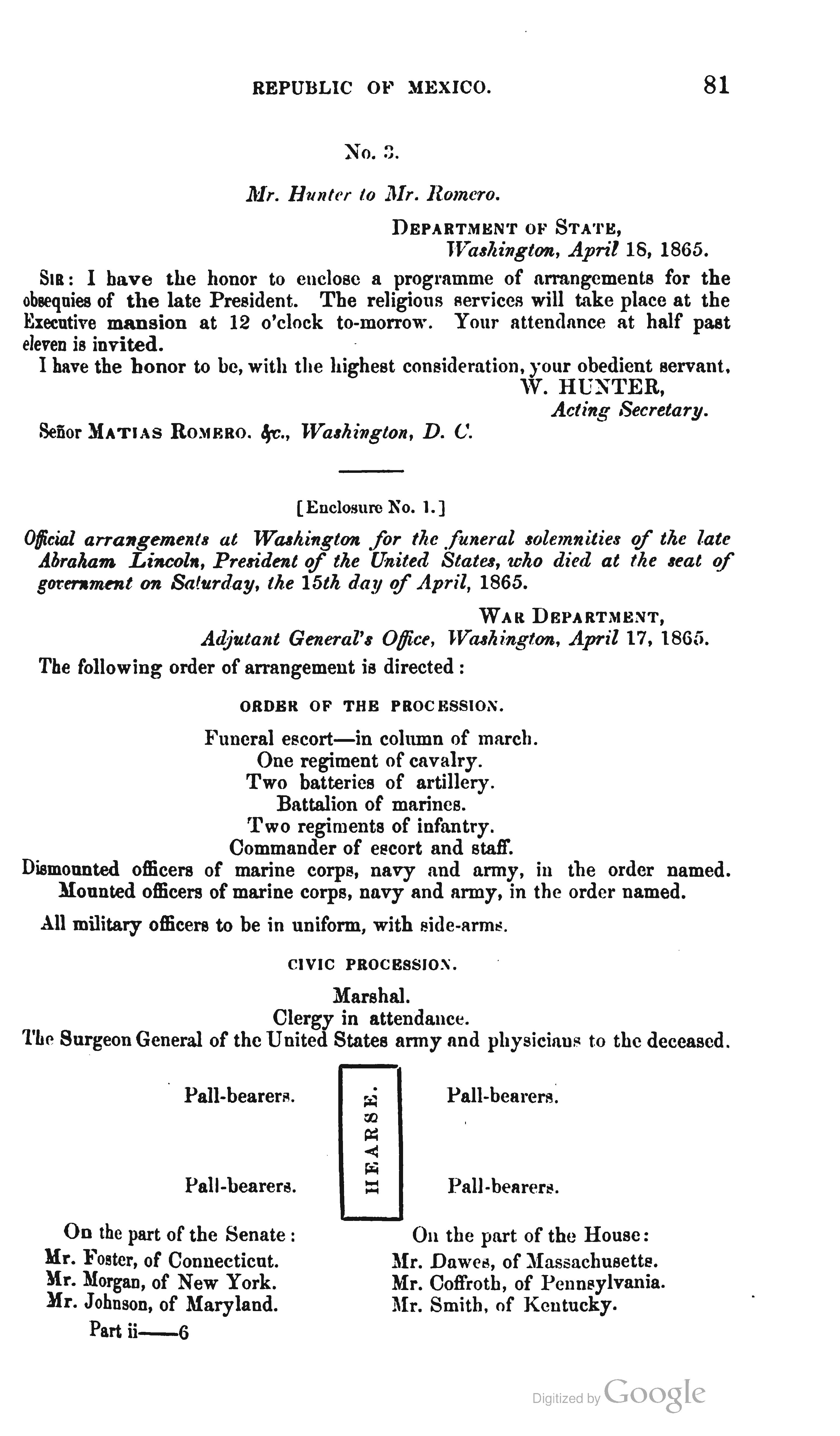
-
Description
This is a letter and invitation to Matias Romero, the minister of the Mexican Republic, to the funeral of President Abraham Lincoln at the White House. It includes the funeral procession, schedule and list of pallbearers.
-
Source
Google Books
-
Rights
This item is in the public domain and may be reproduced and used for any purpose, including research, teaching, private study, publication, broadcast or commercial use, with proper citation and attribution.
-
Creator
William Hunter
-
Publisher
Government Printing Office
-
Date
April 18, 1865
from May. 16, 1865
Department of Foreign Relations and Government - Mexican Response to Lincoln Assassination
-
Full Title
Department of Foreign Relations and Government - Mexican Response to Lincoln Assassination
-
Description
In this official letter from the exiled Mexican government, Sebastián Lerdo de Tejada, the minister of foreign affairs, notifies the United States of their remorse for the death of President Abraham Lincoln. The letter says the Mexican government will fly flags at half mast and wear mourning attire for nine days to honor Abraham Lincoln. Lerdo de Tejada served as second in command to exiled Mexican President Benito Juarez during the "French Intervention" which began in 1861. The French, backed by conservatives and nobility in Mexico, tried to overthrow Mexican President Benito Juarez. Juarez set up his government in exile in northern Mexico, in Chihuahua City, and eventually won the war in 1867.
-
Transcription
Hon. William H. Seward, &c.
_____
[Enclosure No. 1. – Translation.]
[Official.]
DEPARTMENT OF FOREIGN RELATIONS AND GOVERNMENT—DEPARTMENT OF GOVERNMENT, FIRST BUREAU.
[Circular.]
The official confirmation has been received that the President of the United States of America, Abraham Lincoln, died at Washington, at seven o’clock and twenty-two minutes, on the morning of the 15th day of April last, in consequence of the wound inflicted upon him by an assassin at half past nine o’clock on the previous night. The deplorable end of President Lincoln is a cause of great regret to the government of the Mexican republic, and to all its good citizens, by reason of his eminent personal qualities and because, during his administration, the government of the United States has continued in the most friendly relations with that of the Mexican republic in the difficult state of affairs thereof.
With the view that the manifestations of the public sorrow for that end event may be adopted, the citizen President directs that the national flag be hoisted at half-mast upon all the public buildings and at all the military stations during the day subsequent to the reception of this circular, and that all the authorities, functionaries, and employés, both civil and military, clothe themselves in mourning during nine days.
Independence and liberty! Chihuahua, May 16, 1865.
LERDO DE TEJADA
The Citizen Governor of the State of ——— .
[Transcription by: Ricarda H., Dr. Susan Corbesero’s Class, Ellis School, Pittsburgh, Pennsylvania] -
Source
Google Books
-
Rights
This item is in the public domain and may be reproduced and used for any purpose, including research, teaching, private study, publication, broadcast or commercial use, with proper citation and attribution.
-
Tags
-
Cite this Item
Sebastián Lerdo de Tejada. "Department of Foreign Relations and Government - Mexican Response to Lincoln Assassination". Government Printing Office. Remembering Lincoln. Web. Accessed December 15, 2025. https://rememberinglincoln.fords.org/node/1124
-
Creator
Sebastián Lerdo de Tejada
-
Publisher
Government Printing Office
-
Date
May 16, 1865
from May. 16, 1865
Department of Foreign Relations and Government - Mexican Response to Lincoln Assassination
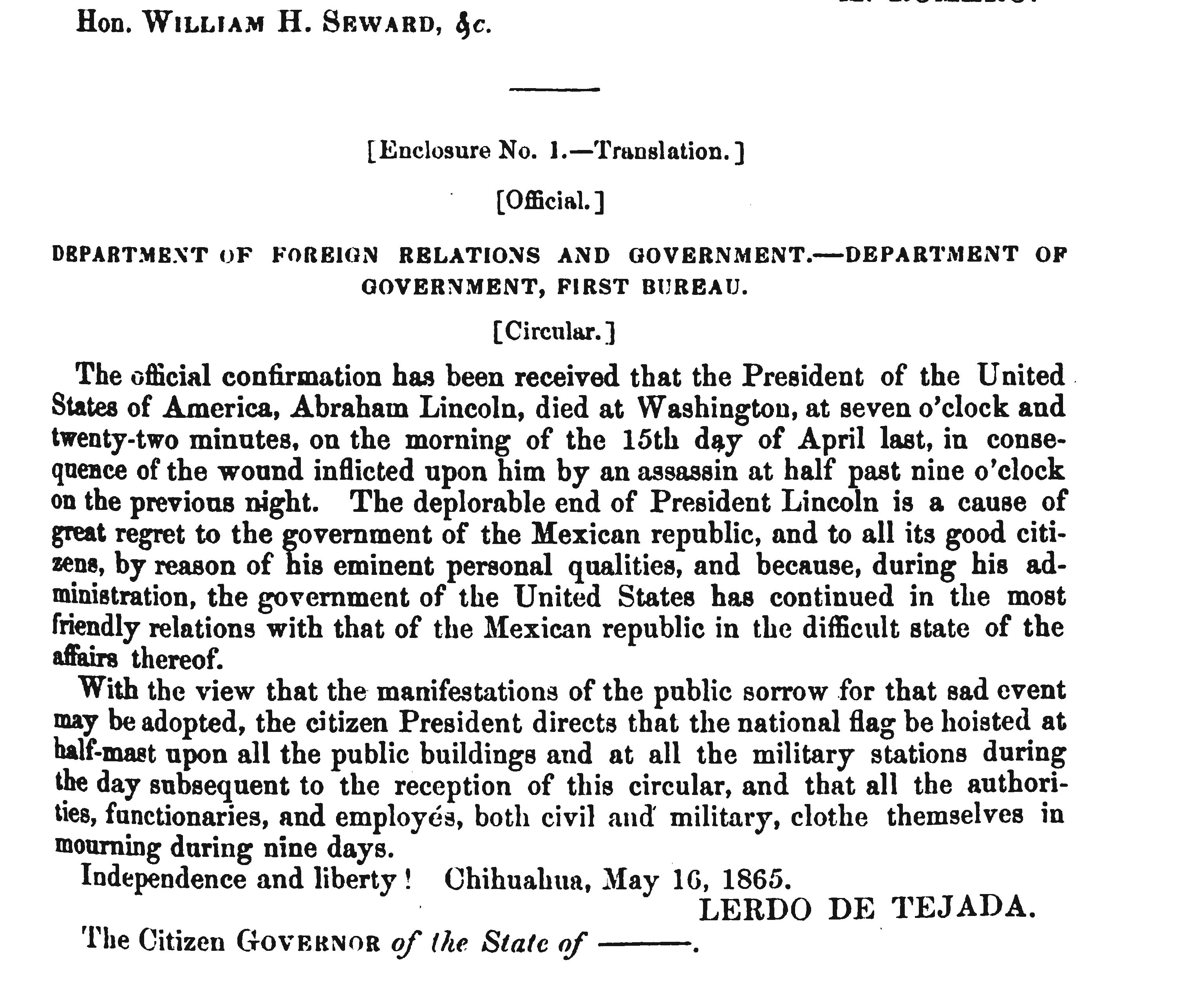
-
Description
In this official letter from the exiled Mexican government, Sebastián Lerdo de Tejada, the minister of foreign affairs, notifies the United States of their remorse for the death of President Abraham Lincoln. The letter says the Mexican government will fly flags at half mast and wear mourning attire for nine days to honor Abraham Lincoln. Lerdo de Tejada served as second in command to exiled Mexican President Benito Juarez during the "French Intervention" which began in 1861. The French, backed by conservatives and nobility in Mexico, tried to overthrow Mexican President Benito Juarez. Juarez set up his government in exile in northern Mexico, in Chihuahua City, and eventually won the war in 1867.
-
Source
Google Books
-
Rights
This item is in the public domain and may be reproduced and used for any purpose, including research, teaching, private study, publication, broadcast or commercial use, with proper citation and attribution.
-
Creator
Sebastián Lerdo de Tejada
-
Publisher
Government Printing Office
-
Date
May 16, 1865
from May. 11, 1865
Mexican President Benito Juarez Response to the Lincoln Assassination
-
Full Title
Mexican President Benito Juarez Response to the Lincoln Assassination
-
Description
This is a condolence letter from the exiled Mexican President Benito Juarez. In the letter Juarez mourns the loss of Abraham Lincoln and also hopes that the U.S. Secretary of State and his son recover from their wounds. On the night of President's assassination, U.S. Secretary of State William Seward was also attacked. He was stabbed repeatedly in his home by conspirator Lewis Powell. Eventually Seward recovered from his wounds. Benito Juarez served as President in Mexico until 1863, when French forces invaded Mexico during the "French Intervention" which began in 1861. The French, backed by conservatives and nobility in Mexico, tried to overthrow Mexican President Benito Juarez. Allies of Juarez fled to New York City, considered a safe haven by Mexican liberals. Juarez set up his government in exile in northern Mexico, in Chihuahua City.
-
Transcription
Hon. William H. Seward, &c.
_____
[Enclosure No. 1. – Translation.]
Chihuahua, May 11, 1865.
My Dear Friend …
We also received the day before yesterday the news of the total defeat of the confederate army on the 9th of April. The great pleasure this news afforded us was marred by the very sad impression which the shocking intelligence of President Lincoln’s assassination produced upon us. That great misfortune has profoundly impressed me, as Mr. Lincoln, who worked with so much earnestness and abnegation for the cause of nationality and freedom was worthy of a better fate than the poniard of a coward assassin. I do most earnestly hope that Mr. Seward’s wounds would not be mortal, and that his son too, may have been saved. I beg of you to pay a private visit to Mr. Seward in my name, expressing to him my grief for the misfortunes befallen upon him, and my best wishes for his speedy and complete recovery.
Benito Juarez
Senor Don Matias Rombro
[Transcription by: Ricarda H., Dr. Susan Corbesero’s Class, Ellis School, Pittsburgh, Pennsylvania]
-
Source
Google Books
-
Rights
This item is in the public domain and may be reproduced and used for any purpose, including research, teaching, private study, publication, broadcast or commercial use, with proper citation and attribution.
-
Tags
-
Cite this Item
Benito Juarez. "Mexican President Benito Juarez Response to the Lincoln Assassination". Government Printing Office. Remembering Lincoln. Web. Accessed December 15, 2025. https://rememberinglincoln.fords.org/node/1123
-
Creator
Benito Juarez
-
Publisher
Government Printing Office
-
Date
May 11, 1865
from May. 11, 1865
Mexican President Benito Juarez Response to the Lincoln Assassination
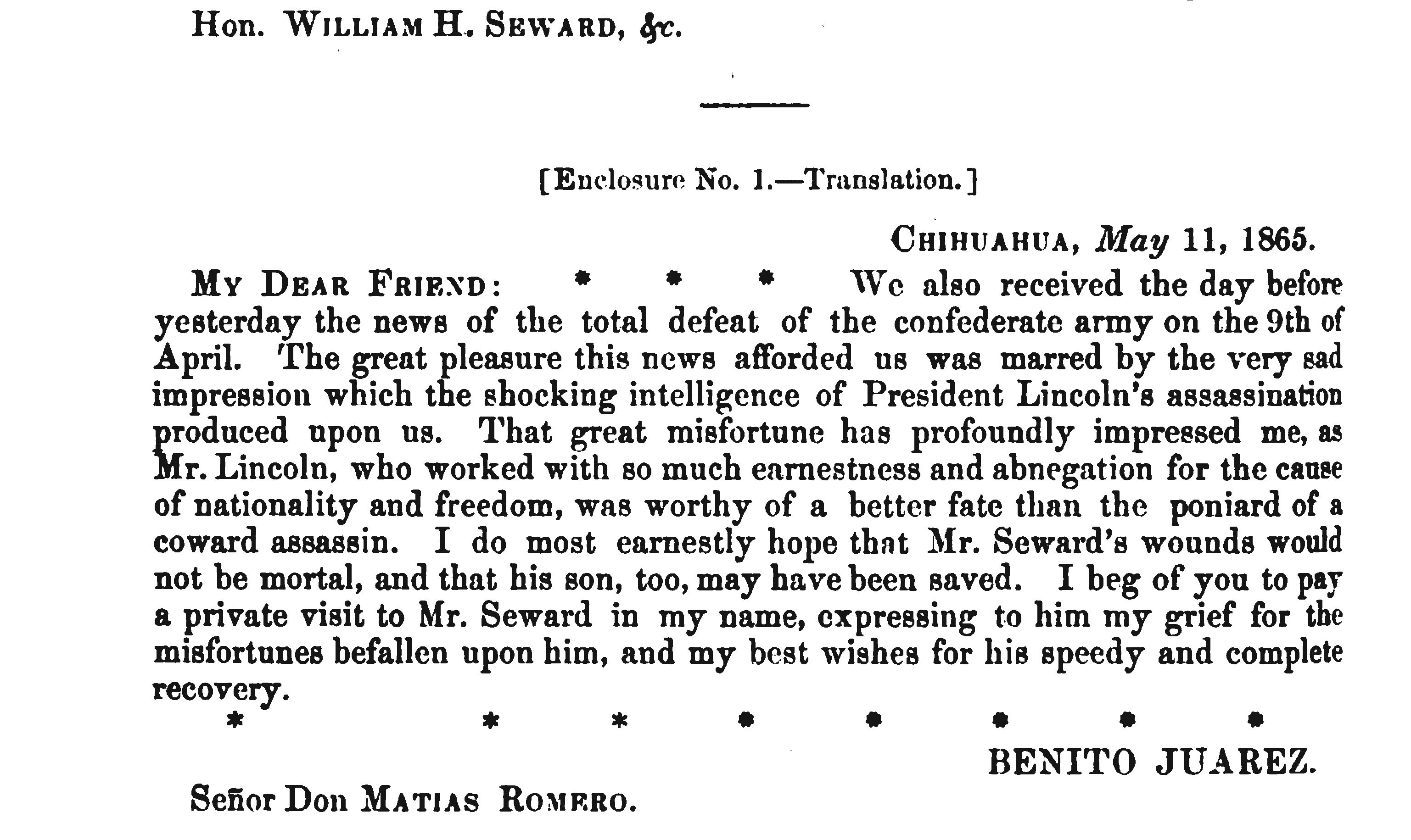
-
Description
This is a condolence letter from the exiled Mexican President Benito Juarez. In the letter Juarez mourns the loss of Abraham Lincoln and also hopes that the U.S. Secretary of State and his son recover from their wounds. On the night of President's assassination, U.S. Secretary of State William Seward was also attacked. He was stabbed repeatedly in his home by conspirator Lewis Powell. Eventually Seward recovered from his wounds. Benito Juarez served as President in Mexico until 1863, when French forces invaded Mexico during the "French Intervention" which began in 1861. The French, backed by conservatives and nobility in Mexico, tried to overthrow Mexican President Benito Juarez. Allies of Juarez fled to New York City, considered a safe haven by Mexican liberals. Juarez set up his government in exile in northern Mexico, in Chihuahua City.
-
Source
Google Books
-
Rights
This item is in the public domain and may be reproduced and used for any purpose, including research, teaching, private study, publication, broadcast or commercial use, with proper citation and attribution.
-
Creator
Benito Juarez
-
Publisher
Government Printing Office
-
Date
May 11, 1865
from Apr. 15, 1865
Condolences from the Mexican Club of New York
-
Full Title
Condolences from the Mexican Club of New York to Secretary of State William Seward
-
Description
This is a condolence letter from the Vice President of the Mexican Club of New York to the U.S. Secretary of State William Seward after news of Abraham Lincoln's assassination reached New York. The letter talks about how important President Lincoln was to the ideals of liberty and freedom in the United States and reaffirms Mexico's commitment to their friendship with the country. The Mexican Club of New York was created in 1864, as exiles from the Mexican government fled Mexico during the French Intervention, which began in 1861. The French, backed by conservatives and nobility in Mexico tried to overthrow Mexican President Benito Juarez. Allies of Juarez fled to New York City, considered a safe haven by Mexican liberals. U.S. Secretary of State William Seward quietly supported the work of the Club but refused to promise too more nor interfere with the war in Mexico. The Club's president, Benito Quijano, had died in early 1865 and at the time of Abraham Lincoln's death a new successor had not been chosen.
-
Transcription
Republic of Mexico
[Enclosure No. 2 – Translation.]
Mexican Club at New York.
New York, April 15, 1865.
Sir: The Mexican Club of New York, profoundly affected by the tragic and premature death of the President of the United States, Abraham Lincoln, has resolved to manifest to your excellency that the citizens which compose it fully sympathize the affliction of the American people; that they look upon the loss of this eminent patriot not only as a great calamity to the United States, but as a just cause of mourning for all the peoples who in America enjoy liberty, or are contending to restore it; and they believe that with Lincoln there has disappeared from earth one of the great benefactors of humanity, who, on descending to the tomb, has been crowned with the laurel of immortality and martyrdom.
To the veneration which Lincoln will have in history, as the personification of the great American people, in his firmness, in his energy, in his enlightenment, and in his magnanimity, to his great title of the emancipator of the slaves, he will always add in the hearts of the Mexicans the acknowledgement which the love of justice and the respect for law inspires, of which he gave proofs, in not sanctioning the outrages committed against Mexico, and in not acknowledging in that republic any other power than that which is derived from the institutions and the free national will.
The Mexican Club, in taking part in the affliction of the people of the United States, upon whom it looks as a nation of brothers, cherishes the hope that as the spirit of Washington has animated this nation in the work of consolidating its institutions, so the spirit of Lincoln may continue to guide it until peace and union are restored, slavery abolished, and until it shall become the bulwark of liberty for all America.
On addressing this manifestation to your excellency, we have the honor to offer to you the assurances of our very distinguished consideration.
In absence of the president, from indisposition,
IGNACIO MEJIA, Vice President.
CIPRIANO ROBERT, Secretary.
Hon. Secretary of State of the United States.
[Transcription by: Ricarda H., Dr. Susan Corbesero’s Class, Ellis School, Pittsburgh, Pennsylvania] -
Source
Google Books
-
Rights
This item is in the public domain and may be reproduced and used for any purpose, including research, teaching, private study, publication, broadcast or commercial use, with proper citation and attribution.
-
Tags
-
Cite this Item
Ignacio Mejia. "Condolences from the Mexican Club of New York to Secretary of State William Seward". Government Printing Office. Remembering Lincoln. Web. Accessed December 15, 2025. https://rememberinglincoln.fords.org/node/1122
-
Creator
Ignacio Mejia
-
Publisher
Government Printing Office
-
Date
April 15, 1865
from Apr. 15, 1865
Condolences from the Mexican Club of New York to Secretary of State William Seward
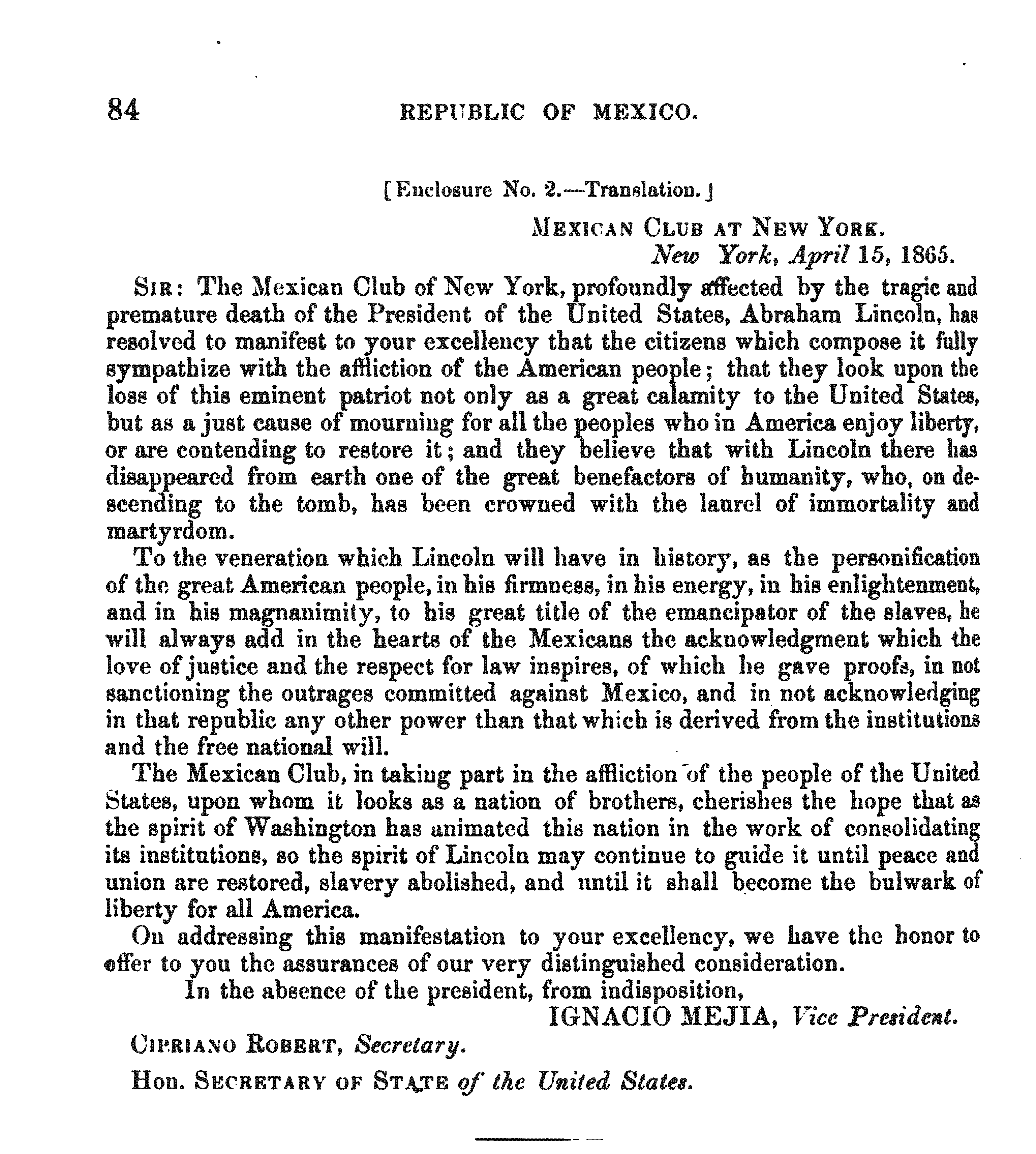
-
Description
This is a condolence letter from the Vice President of the Mexican Club of New York to the U.S. Secretary of State William Seward after news of Abraham Lincoln's assassination reached New York. The letter talks about how important President Lincoln was to the ideals of liberty and freedom in the United States and reaffirms Mexico's commitment to their friendship with the country. The Mexican Club of New York was created in 1864, as exiles from the Mexican government fled Mexico during the French Intervention, which began in 1861. The French, backed by conservatives and nobility in Mexico tried to overthrow Mexican President Benito Juarez. Allies of Juarez fled to New York City, considered a safe haven by Mexican liberals. U.S. Secretary of State William Seward quietly supported the work of the Club but refused to promise too more nor interfere with the war in Mexico. The Club's president, Benito Quijano, had died in early 1865 and at the time of Abraham Lincoln's death a new successor had not been chosen.
-
Source
Google Books
-
Rights
This item is in the public domain and may be reproduced and used for any purpose, including research, teaching, private study, publication, broadcast or commercial use, with proper citation and attribution.
-
Creator
Ignacio Mejia
-
Publisher
Government Printing Office
-
Date
April 15, 1865
from Apr. 19, 1865
The Feeling in Canada
-
Full Title
The Feeling in Canada
-
Description
In this article the emotions of the nation following the death of Abraham Lincoln can be seen in great detail. The aspects of his noble character that won over the public are also mentioned frequently. There is even discussion of why the assassin committed this horrendous deed before questioning why John James Booth killed assassinated the president. His mental health is also questioned
-
Transcription
THE FEELING IN CANADA
________
Opinion of the Leading Canadian Journal—The Deep Regard and Affection Felt forThe President—The Secessionists Carousing in Honor of the Assassin—A Plea for The Murderer—His Crime Justified.
From the Toronto Globe.
ABRAHAM LINCOLN.
At twenty-two minutes after seven o’clock, on Saturday morning, about nine hours after he had received the shot of the assassin, ABRAHAM LINCOLN drew his last breath, surrounded by the members of his family, his Cabinet, and leading political and personal friends. His death would, under any circumstances, have produced an extraordinary sensation, but accompanied by murderous violence, the feeling which has been created has been the most intense. No single event of the present century in America can at all compare with it in effect on the popular mind, and we think that in England the shock will be nearly as deeply felt. The grief which is expressed has two very distinct origins, the stronger of which seems to arise from personal sympathy and regard for the deceased. We hear in all quarters the strongest expressions of admiration of the character of Mr. LINCOLN, and deep sorrow that his noble career should have been brought to an untimely end. His simplicity of charafter [character[, his straightforward honesty, his kindliness, even his bluntness of manner, seem to have won the popular heart, even among a foreign, and, in matter of opinion, a hostile nation. We may judge by that fact of his popularity among the citizens of the Northern States. Almost all of us feel as if we had suffered a personal loss. Mr. LINCOLN is spoken of in the same terms as are used toward a familiar friend. All mourn his untimely fate. He had risen by industry, ability and integrity to the great position of Chief Magistrate of his country. He found it in the most imminent danger, and his power to control the elements which were sweeping over the land were far from generally acknowledged. He was regarded with fear and trembling by the friends of his government, and with contempt by his opponents. But steadily he made his way. He was not the best man who could have been imagined for the post of Chief Magistrate in a great civil war. He had not the commanding force which infuses energy into all around him, and his public appearances were often lacking in dignity. But he was sagacious, patient, prudent, courageous, honest and candid. If he did not inspire great Generals, he gave every man in the army an opportunity of developing the talents within him. He recognized merit and rewarded it. He placed confidence, as a rdle [rule], where it was due, and he had his reward in great military successes. Some say that he has been cut off at a favorable moment for his reputation but we cannot accept this view. It seems to us that he had gone through his worst trials, that his patience, sagacity and honesty would have borne even better fruits in the settlement of the affairs of the South than during the wild commotion of the war. He has been cut off at a time when, certainly, he had accomplished a great deal, but leaving much undone which he was well qualified to do. A naturally strong man, of only fifty-six, he might have hope to live many years after finishing his work as President, in the enjoyment of the respect and admiration justly due to one who had saved the life of his country. He will be held, we think, by Americans, if not equal to WASHINGTON, second to none but he. But he had not the gratification of his great predecessor, of seeing his work completed and enjoying for a long period the gratitude of his countrymen and the admiration of strangers. There are few so hard of heart as to not shed a tear over the sudden and bloody termination of so bright a career. As great as WASHINGTON in many moral and mental qualities, his genial character was calculated to win far more popular sympathy than his predecessor. Ability and honesty all admire, but when to them are added kindliness, simplicity, and freedom from selfishness, haughtiness and pride in high position, they win love as well as respect.
THE MURDER JUSTIFIED
From the Toronto Leader
A man may, on the spur of the moment, be so maddened with rage as to strike another down to the earth; but if the accounts which come to us of this distressing affair are correct, the attack upon both Mr. LINCOLN’s and Mr. SEWARD’s lives were concocted some time prior to the inauguration ceremony on the 4th of March, and only failed of accomplishment because one of the parties in the plot lost heart to carry out the scheme at that time. Would that he had never found it again! The act was not committed without due time for reflection as to its awful nature. For over a month the plan remained unacted upon in the bosom of its author, and time seems but to have added to the burning desire to carry it out. There must have been a strong feeling on the part of the person who committed the crime that a grievous wrong had been done, either to himself or to his country, by the President or the government he represented. Had a Southern man, during the four years of the war, taken the life of the President, there would be no difficulty in tracing it to a cause. We cannot so soon forget the numberless acts of wickedness committed in the South by the servants and emissaries of the Northern Government; the beautiful homesteads leveled to the ground with demoniacal fury; the fair women violated by a ribald soldiery; the brave men shot down in the coldest blood on the insane plea of retaliation—all this and much more is still fresh in our memories, and serve to remind us that if the assassination had been committed in the heat of the war by a Southern man, who had so much to drive him to desperation, a reason for his conduct could readily be found. In the present instance these considerations do not help us to discover the cause of the assassination. That the deed was committed by JOHN WILKES BOOTH, a brother of EDWIN BOOTH, the celebrated actor of the present day, there seems to be little doubt. But why should he make himself the champion of the Southern people or the Southern cause? He must have been goaded almost to the verge of madness. No man of ordinary nerve or trivial impulse could have jumped into a private box at the theatre, as he did, calmly shoot down the object of his wrath, then spring on the stage uttering words which serve to give a clue to the act of assassination, and ultimately find his way through the theatre to a place of escape. The man who could have done all this, must have considered that his chances of escape were very few indeed, and that, if need were, he was ready to give up his own life for that which he had taken. There is desperation in such a thought—such a desperation as is caused by a deep consciousness of wrong-doing on the part of the persons against whom it is conceived.
The feeling in Montreal
MONTREAL, Tuesday, April 18.
The following proclamation has been issued by the Mayor of Montreal:
PROCLAMATION.
Whereas Wednesday next, the 19th of April inst., at noon, has been fixed upon for the funeral ceremonies of the Chief Magistrate of the United States, the undersigned, Mayor of the City of Montreal, respectfully invites the citizens generally to close their places of business from 12 o’clock noon on that day, as a tribute of respect to the memory of the late President of the United States, and of sympathy with the bereaved members of his family, and also as an expression of the deep sorrow and horror felt by the citizens of Montreal at the atrocious crime by which the President came to an untimely death.
(Signed) J. L. BEAUDRY, Mayor
Arrival of Gen. Lee in Richmond.
The Richmond Whig of yesterday says:
Gen. R. E. LEE arrived in this city about 3 o’clock Saturday evening, attended by five members of his staff. He rode into the city over the pontoon bridge at the foot of Seventeenth-street, and thence up Main-street to his residence on Franklin-street between Seventh and Eighth-streets.
[Transcription by: Deborah Taylor.] -
Source
THE FEELING IN CANADA. (1865, Apr 19). New York Times (1857-1922) Retrieved from http://blume.stmarytx.edu:2048/login?url=https://search.proquest.com/docview/92001549?accountid=7076
-
Rights
This item is in the public domain and may be reproduced and used for any purpose, including research, teaching, private study, publication, broadcast or commercial use, with proper citation and attribution.
-
Tags
-
Cite this Item
Toronto Globe . "The Feeling in Canada". New York Times. Remembering Lincoln. Web. Accessed December 15, 2025. https://rememberinglincoln.fords.org/node/1120
from Apr. 19, 1865
The Feeling in Canada

-
Description
In this article the emotions of the nation following the death of Abraham Lincoln can be seen in great detail. The aspects of his noble character that won over the public are also mentioned frequently. There is even discussion of why the assassin committed this horrendous deed before questioning why John James Booth killed assassinated the president. His mental health is also questioned
-
Source
THE FEELING IN CANADA. (1865, Apr 19). New York Times (1857-1922) Retrieved from http://blume.stmarytx.edu:2048/login?url=https://search.proquest.com/docview/92001549?accountid=7076
-
Rights
This item is in the public domain and may be reproduced and used for any purpose, including research, teaching, private study, publication, broadcast or commercial use, with proper citation and attribution.
-
Creator
Toronto Globe
-
Publisher
New York Times
-
Date
April 19, 1865
from Apr. 29, 1865
Letter from L.D. Bradley to Minnie Bradley
-
Full Title
Letter from L.D. Bradley to Minnie Bradley
-
Description
Letter from L. D. Bradley to Minnie Bradley, dated April 29, 1865 and sent from Galveston, in which he writes about his concern for her health, mentions the death of President Lincoln and his presumptions about its effect on the war.
-
Transcription
Galveston, April 29th 1865,
Jimmy McIlveen,
Taz Watson
Jim Blackmon
Little Honey(?),
Since writing to you I have received your letters of the 9th, 13th & 16th of April; the two first arrived two or three days since, the last, this evening. I have been very uneasy about the baby; your letter received this evening, however, somewhat, though not entirely, reassures me. I am becoming a good deal uneasy about you also Little Darling; in your other letters you mention that you have had for some time a very troublesome cough; in the last one, you say you have quite a severe pain in the shoulder and breast. Little Honey, my own darling little wife, you must take more, and better, care of yourself. I knew perfectly well your disposition to worry, and do all the work about the children yourself; to get up in the night to wait upon them &c; now that must be stopped. You ought to recollect, Little Honey, that with me it is exactly as if I had no one in the world to love, or be loved by, but yourself. It is very true that I love the children, but, Little Darling, when I think of you in comparison with any one, or all, others, it seems to me that you are my “all in all”. I have commenced writing back(?) this evening, on account of having just received your letter, & having some leisure time, but do not expect to finish until to-morrow; Jimmy McIlveen & Taz Watson start up on Monday, that is day after to-morrow, and I will send this letter by one of them. By the way, Little Honey, two or three of the company have come from home recently, all of whom say that they saw your father in town about the time they were starting, & still no letter from you by any of them. I know perfectly well that it is not your fault, but then I would like to know the reason for it. There is no late news of interest except what you have probably learned through the papers. Lincoln & Seward being killed seems to be regarded as a kind of offset to the surrender of Lee & his army. The number surrendered by Lee has settled down to something less than 12,000, and they seem to have been mostly detailed men, reserves &c; if such is the case they are but very little loss. The loss in machinery, stores &c, however, was very large; for the Confederates, it was immense; and one which will not be easily recovered from. I have not a particle more of doubt as to the result of this war now, then I had three years ago, or at its commencement; I think however it is fast tending towards a guerrilla arrangement, In some respects that would suit me very well; there would then be no dodgers or shirkers; every body would have to be on one side or the other; and, best of all, I think it would take but a very short time for guerrillas to make a clean riddance of Speculators, extortioners, and all the other species of the [illegible] kind, who have been infesting the confederacy. On the other hand, it would be terrible on women & children, and in that I am particularly interested. There is one thing however very certain; if events do turn out in that way; wherever I may go, & in whatever I may engage, I shall always keep you very near to me. But I will not endeav-er not to anticipate any thing further, of a gloomy character; it is bad enough any how; without the trouble of anticipating. I have just heard of Jim Blackmon’s death; very bad is it not? It was very unexpected also, for the last news received from him was that he would probably, by this time, have been exchanged. In fact I was fully expecting to hear of his being at home, instead of his death. I will close now, Little Honey, until to-morrow. I have been a little sick for a day or two; a very bad cold, discrelined system &c, which makes me feel more gloomy than I would otherwise be; by to-morrow however I hope to be not only in better health, but better spirits.
April 30th 1865
Little Darling –
There is nothing more in the way of news today than there was yesterday; Some runners, but no reliance placed in them. One is that President Andy Johnson & Stanton, the Federal Sec’y of War, have been assassinated; another, that Genl Joe. Johnston has whipped Sherman, being good, both of them, if true. If the game of killing the U.S. Presidents is properly kept up, it will soon be so that no one will accept the position; that will probably produce so much confusion, and in fact, anarchy, it will interfere very much with their proper administration of affairs, and therefore give us a much better chance in this war. As a general thing, I am very much opposed to assassination, but when it comes to killing such men as Lincoln, Johnson, Seward &c, men who have been the cause of slaughtering thousands of our best people, and who have made desolate thousands of homes in the Confederacy, I approve it very highly; for they deserve death richly, and as they do not expose themselves to any of the dangers of battle, &c, which they im-pose upon others, I think it a very proper plan to kill them in any manner whatsoever in which it can be accomplished.
I am not getting along quite as well as usual; I have been about half sick for two or three days, & don’t appear to be getting over it. I can sympathize with you as to the cough you complain of; for I do considerable coughing myself. I think though, that in a day or two I will be entirely well. I have a piece of calico to make me a shirt, which I will send to you by the first practicable opportunity. Say to Bobolinks that I received her letter, and will write her one in a very few days. Isn’t it a delightful childs letter, Little Honey; just exactly the way she talks. Kiss the children for me Little Darling and, please mam, try to take good care of yourself. Write frequently. [illegible]
[Transcription by: Rodney Peacock]
-
Source
Pearce Museum at Navarro College via The Portal to Texas History
-
Rights
This item is in the public domain.
-
Tags
-
Cite this Item
L.D. Bradley. "Letter from L.D. Bradley to Minnie Bradley ". Remembering Lincoln. Web. Accessed December 15, 2025. https://rememberinglincoln.fords.org/node/1119
from Apr. 29, 1865
Letter from L.D. Bradley to Minnie Bradley
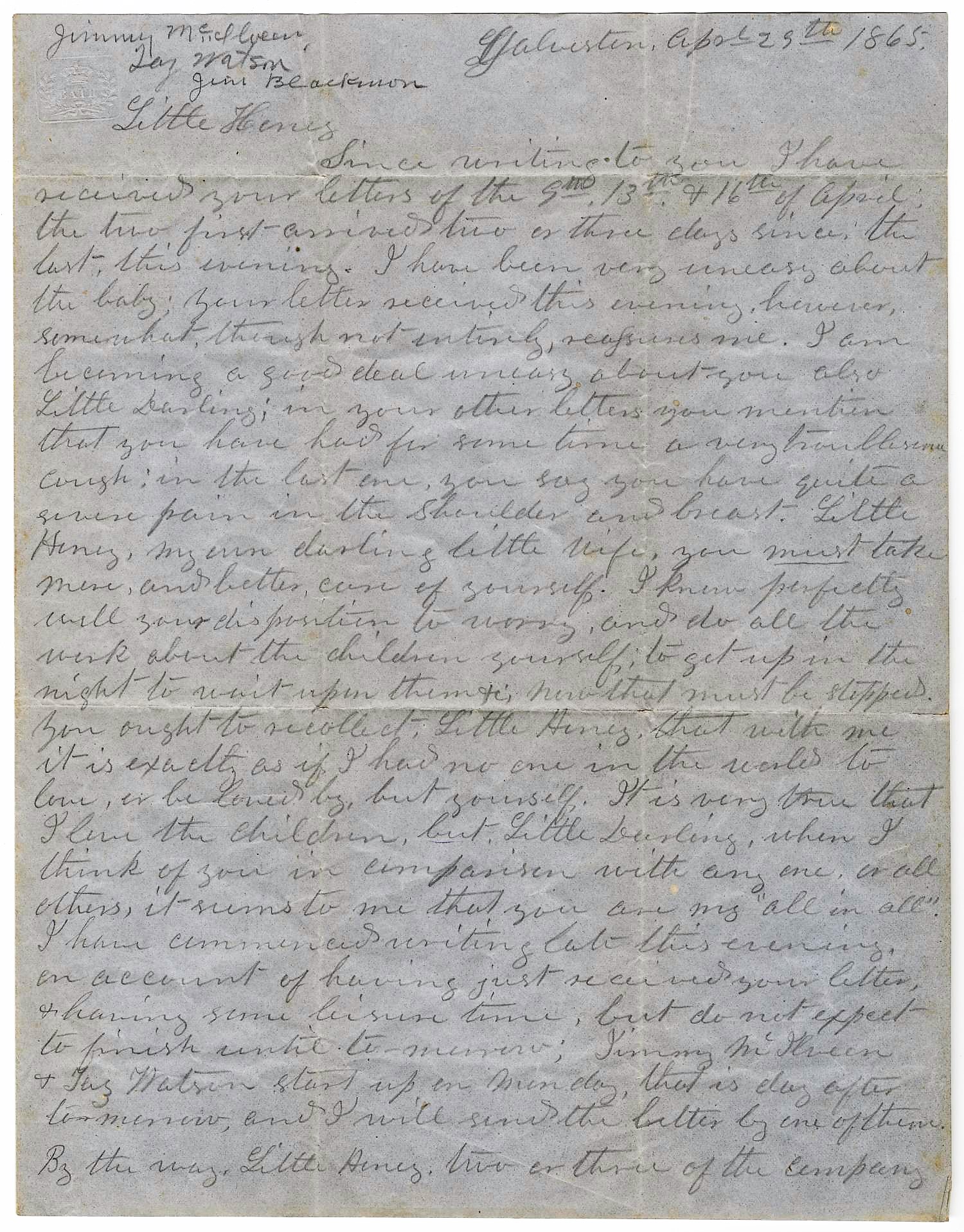
-
Description
Letter from L. D. Bradley to Minnie Bradley, dated April 29, 1865 and sent from Galveston, in which he writes about his concern for her health, mentions the death of President Lincoln and his presumptions about its effect on the war.
-
Source
Pearce Museum at Navarro College via The Portal to Texas History
-
Rights
This item is in the public domain.
-
Creator
L.D. Bradley
-
Date
April 29, 1865
-
Dimensions
[4] p. ; 27 cm
from May. 1, 1865
Letter to Mary Todd Lincoln from Queen Victoria
-
Full Title
Letter to Mary Todd Lincoln from Queen Victoria
-
Description
Manuscript transcription of a letter from Queen Victoria to Mrs. Abraham Lincoln, written in purple ink on white woven paper. Queen Victoria, the British monarch, wrote to Mary Lincoln after learning about the assassination of Abraham Lincoln. The two women had never met, but Queen Victoria wanted to convey her sympathies to Mrs. Lincoln because she also lost her husband in 1861 and went into intense mourning.
-
Transcription
Copy of a letter from Queen Victoria to Mrs. President Lincoln Osborne, April. 1865
Thought a stranger to you, cannot remain silent w[?] so terrible a calamity has fallen upon you and your country; and must personally express my deep and heartfelt sympathy wi[?] you under shocking circumstances of your present— dreadful misfortune. No one can better appreciate, than I can, who am myself utterly broken hearted by the loss of my own beloved husband, who was the light of my life, my stay, my all, —what your own sufferings must be, and I earnestly pray that you may be supported by Him, to whom alone the sorely stricken can look for comfort in their hour of heavy afflication.
With the renewed expression of true sympathy, I remain, dear Madam, Your sincere friend, Victoria -
Source
Library of Congress
-
Rights
This item is in the public domain and may be reproduced and used for any purpose, including research, teaching, private study, publication, broadcast or commercial use, with proper citation and attribution.
-
Tags
-
Cite this Item
Queen Victoria. "Letter to Mary Todd Lincoln from Queen Victoria". Remembering Lincoln. Web. Accessed December 15, 2025. https://rememberinglincoln.fords.org/node/1108
-
Creator
Queen Victoria
-
Date
1865
-
Dimensions
21 x 11 cm
from May. 1, 1865
Letter to Mary Todd Lincoln from Queen Victoria
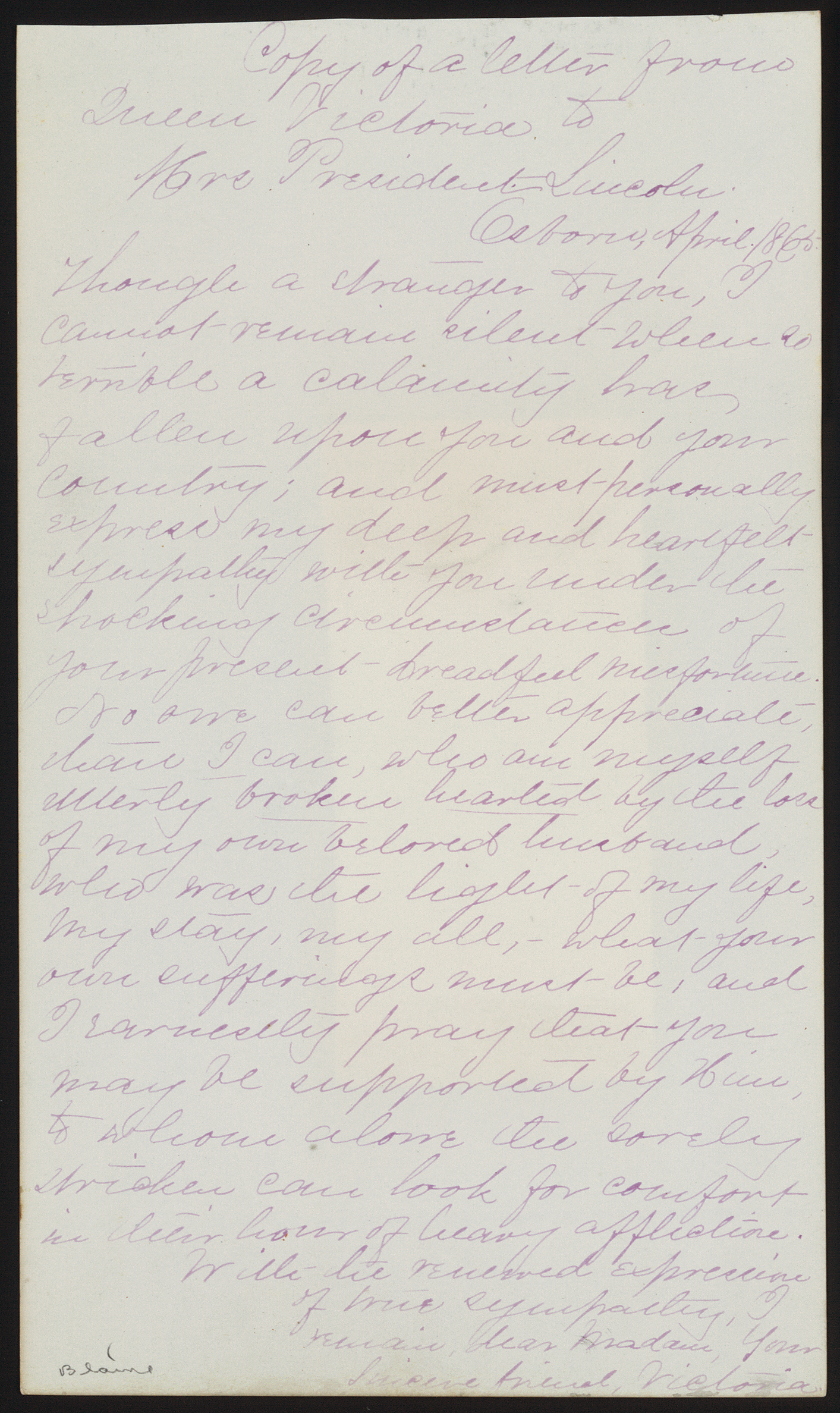
-
Description
Manuscript transcription of a letter from Queen Victoria to Mrs. Abraham Lincoln, written in purple ink on white woven paper. Queen Victoria, the British monarch, wrote to Mary Lincoln after learning about the assassination of Abraham Lincoln. The two women had never met, but Queen Victoria wanted to convey her sympathies to Mrs. Lincoln because she also lost her husband in 1861 and went into intense mourning.
-
Source
Library of Congress
-
Rights
This item is in the public domain and may be reproduced and used for any purpose, including research, teaching, private study, publication, broadcast or commercial use, with proper citation and attribution.
-
Creator
Queen Victoria
-
Date
May 1, 1865
-
Dimensions
21 x 11 cm
from Apr. 14, 1865
Horatio Nelson Taft Diary, April 6-14, 1865
-
Full Title
Horatio Nelson Taft Diary, April 6-14, 1865
-
Description
This excerpt from the diary of Horatio Nelson Taft is an insight into some of the first reactions of citizens of the Union to the death of President Lincoln. Taft, who was a patent clerk, laments Lincoln's teach and denounces the assassination as assassination at it's worst. In the entry just prior to the excerpt describing Lincoln's death, Taft described the return of Lincoln to Washington after a Union victory.
-
Transcription
April 6th 1865
Mr Lincoln has been in Richmond. Near half of the City has been destroyed by fire by the
Rebels themselves as they evacuated it. Large numbers of prisoners have been captured
by Sheridan, Genl Ewell and his Corps, some seven thousand.
April 9, 1865
Genl Lee has surrendered to Genl Grant with his whole Army!! Mr Lincoln has returned to
Washington as in fine Spirits at the prospect of a speedy peace. It is thought that Johnson
and the other rebel Genls will give up now that Lee has surrendered.
April 14th ½ past 10 o'clock P.M.
O, fatal day. O, noble Victim.
Treason has done its worst.
The President has been Assassinated.
It has just been announced at my door
that he was shot a half hour ago at Fords Theatre.
Is it possible?
I have just come from near the scene,
it is too True. 11, o'clock P.M. -
Source
memory.loc.gov
-
Rights
This item is in the public domain and may be reproduced and used for any purpose, including research, teaching, private study, publication, broadcast or commercial use, with proper citation and attribution.
-
Tags
-
Cite this Item
Horatio Nelson Taft. "Horatio Nelson Taft Diary, April 6-14, 1865". Remembering Lincoln. Web. Accessed December 15, 2025. https://rememberinglincoln.fords.org/node/1107
from Apr. 14, 1865
Horatio Nelson Taft Diary, April 6-14, 1865

-
Description
This excerpt from the diary of Horatio Nelson Taft is an insight into some of the first reactions of citizens of the Union to the death of President Lincoln. Taft, who was a patent clerk, laments Lincoln's teach and denounces the assassination as assassination at it's worst. In the entry just prior to the excerpt describing Lincoln's death, Taft described the return of Lincoln to Washington after a Union victory.
-
Source
memory.loc.gov
-
Rights
This item is in the public domain and may be reproduced and used for any purpose, including research, teaching, private study, publication, broadcast or commercial use, with proper citation and attribution.
-
Creator
Horatio Nelson Taft
-
Date
April 14, 1865
-
Material
bound paper with script in ink and type
from Aug. 20, 1867
Memorial of President Lincoln in London
-
Full Title
Memorial of President Lincoln in London
-
Description
This article from the San Antonio Express cites an article from the London Star, purporting that a memorial was being built in London to honor of President Lincoln and the abolition of slavery in the United States.
-
Transcription
MEMORIAL OF PRESIDENT LINCOLN in LONDON.—
The London Star says. There are no building in London a church, a public hall and a school-room attached, intended to be a memorial of the abolition of slavery in America, and of the public services of the late President Lincoln. The work is under the superintendence of Dr. F. Tompkins, D. C. L. who who has spent some time in America. The Rev. C.W. Dension, the American agent, has not presented this object in Paris, as a meeting was held on the subject at the Salle Evangeline, in the exhibition on Thursday. J. P. Reynolds, one of the commissioners for the State of Illinois, presided, and the Rev. T. B. Hart, the minister of the English Chapel, Rue Royale, officiated as secretary. Statements with reference to the memorial were made by the Rev. Mr. Denison, the Hon. Mr. Usher, Dr. Smith of Boston, Dr. Freeze of New Jersey, and others, and a resolution commenting it was passed by the meeting.
[Transcription by: Ricarda H., Dr. Susan Corbesero’s Class, Ellis School, Pittsburgh, Pennsylvania] -
Source
infoweb.newsbank.com
-
Rights
N/A
-
Tags
-
Cite this Item
San Antonio Express. "Memorial of President Lincoln in London". San Antonio Express. Remembering Lincoln. Web. Accessed December 15, 2025. https://rememberinglincoln.fords.org/node/1105
from Aug. 20, 1867
Memorial of President Lincoln in London
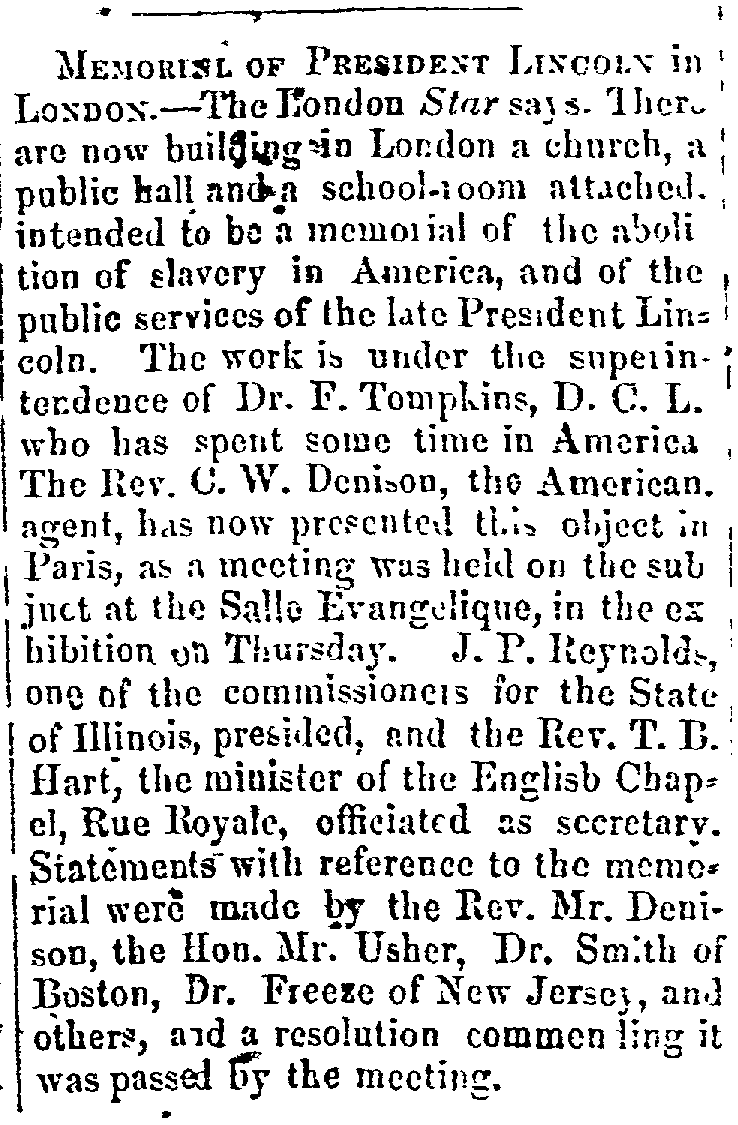
-
Description
This article from the San Antonio Express cites an article from the London Star, purporting that a memorial was being built in London to honor of President Lincoln and the abolition of slavery in the United States.
-
Source
infoweb.newsbank.com
-
Rights
N/A
-
Creator
San Antonio Express
-
Publisher
San Antonio Express
-
Date
August 20, 1867
-
Material
newspaper
